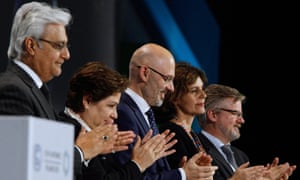Extract from The Guardian
Decisions made from now to 2020 will determine to what extent Earth remains habitable
The mood was more one of relief than triumph on Sunday when the
world’s governments eventually found common ground at the UN climate
talks in Katowice, Poland.
This was not just because exhausted delegates were glad to go home after negotiations that dragged on 30 hours beyond the deadline. It also reflected the harder miles and tougher battles to come over the next two years if the planet is to remain habitable.
Scientist after scientist told the conference that the decisions made by 2020 will determine whether global heating can be kept to less than 1.5C above pre-industrial levels, after which the already apparent dangers of climate instability become far worse.
The toughest decisions, however, were pushed into the future, to a special climate summit next September called by the UN secretary general, António Guterres, and the next two COP conferences – in Chile in December 2019, and then to the country chosen to host in 2020.

This was not just because exhausted delegates were glad to go home after negotiations that dragged on 30 hours beyond the deadline. It also reflected the harder miles and tougher battles to come over the next two years if the planet is to remain habitable.
Scientist after scientist told the conference that the decisions made by 2020 will determine whether global heating can be kept to less than 1.5C above pre-industrial levels, after which the already apparent dangers of climate instability become far worse.
The toughest decisions, however, were pushed into the future, to a special climate summit next September called by the UN secretary general, António Guterres, and the next two COP conferences – in Chile in December 2019, and then to the country chosen to host in 2020.

The result was a new global rulebook on emissions that requires nations to report every two years on their progress towardParis agreement commitments to keep temperature rises to between 1.5C and 2C.
Several past obstacles were overcome. China accepted standards on transparency, and richer nations – particularly Germany and Norway – put their hands deeper into their pockets to provide more than $100bn (£80bn) to help poorer nations adapt. A renewed division between the developed and developing world did not materialise as feared.
But more fundamental obstructions also came more sharply into focus. The malign role of fossil fuel interests has often been hidden in bureaucratic language or lost in the distractions of diplomatic spats, but in Katowice there were several moments of blinding clarity. Chief among them was the alignment of the world’s top three oil-producing nations – the US, Russia and Saudi Arabia – to downplay scientific warnings about temperature rises beyond 1.5C. Soon after, an ambassador from Australia – a major coal exporter – joined Trump administration officials in a panel that promoted carbon fuels. Brazil also held up talks with a highly contested carbon-accounting proposal that could have reshaped how emissions from the Amazon are calculated.
There was also more clarity as a result of the recent protests in France, which prompted policymakers to think twice about the social implications of higher fuel prices. The leading energy economists Nicholas Stern and Ottmar Edenhofer said carbon taxes were still an important instrument to nudge economies away from fossil fuels, but that the transition has to be fair as well as fast, which means using the extra tax revenue for green infrastructure or redistributing it among poorer members of society who are often hardest hit by fuel tax rises.
Tensions will grow along with the stakes, as will frustration at the widening gap between the science and politics. More protests and lawsuits can be expected from climate litigation groups, financial divestment activists and a growing number of direct action campaigners, including 350.org, Extinction Rebellion and striking students such as Greta Thunberg. They, along with many scientists, say it is not enough to agree on rulebooks. After delaying action for so long, they argue the world now needs leaps rather than steps.
All of which suggests the next two years will be among the most fraught and crucial in the history of humanity. Investment decisions on power stations and infrastructure taken during this period will determine whether carbon emissions can be cut by the 45% needed by 2030 to give the 1.5C target a chance.
It would be fitting if the UK won the right to host the crucial climate summit in 2020. Done well, it would showcase how the world’s first industrialised nation is shifting away from carbon faster than almost any other. Done badly, the UK – by then probably outside the EU – will highlight the folly of shifting away away from multilateralism just when when the world needs to pull together.


No comments:
Post a Comment